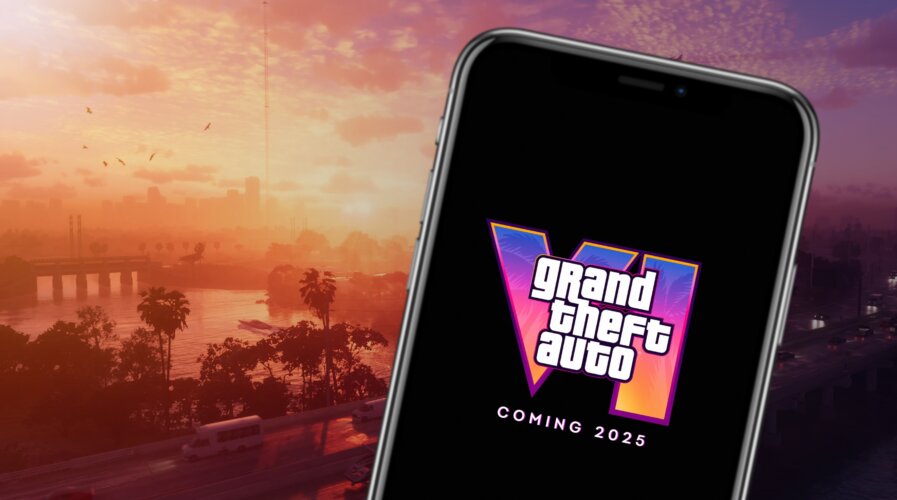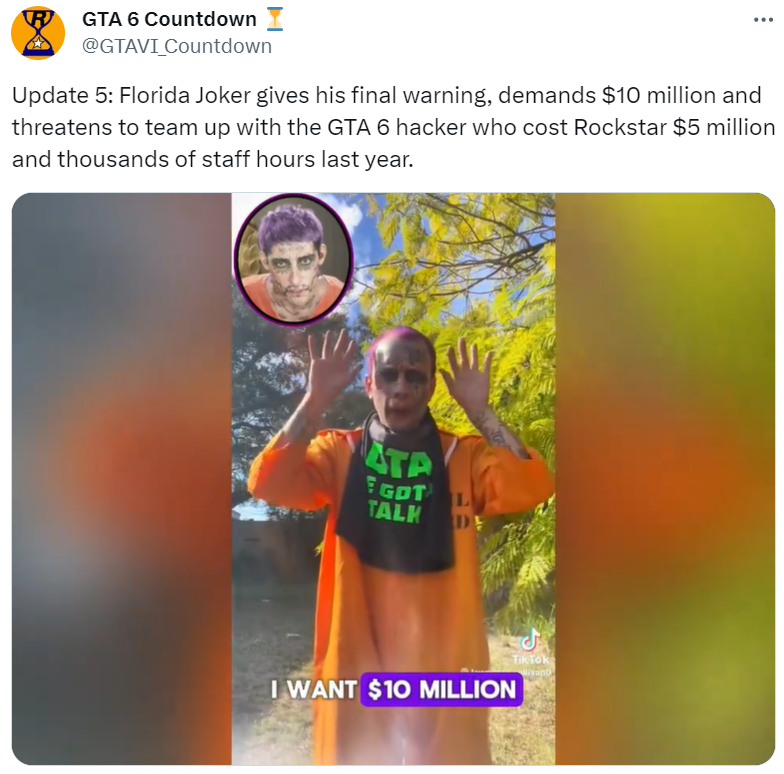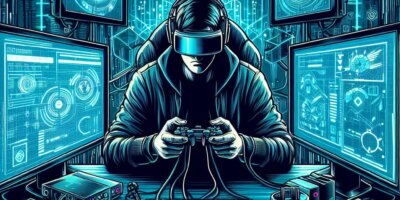
The fallout of GTA 6 leaked gameplay and its legal repercussions. (Source – Shutterstock).
GTA 6 leaked gameplay triggers controversy
- GTA 6 leaked gameplay clips result in a hacker’s life sentence and a legal clash with Florida Joker demanding US$10 million from Rockstar Games.
- Florida Joker seeks US$10 million from Rockstar Games over GTA 6 character likeness amid the game’s financial triumph.
- GTA 6 hacking case stirs debate on character rights in gaming, blurring lines between real and virtual worlds.
The story of the 18-year-old hacker who last year illegally accessed and distributed numerous Grand Theft Auto 6 clips and was consequently sentenced to lifelong confinement in a hospital prison has resurfaced. This resurgence of interest is linked to recent developments involving an individual known as ‘Florida Joker,’ who has threatened to collaborate with the GTA 6 hacker in a campaign against Rockstar Games, demanding a staggering US$10 million.
Who is Florida Joker? And what’s with the legal standoff with Rockstar Games?
Lawrence Sullivan, better known as the Florida Joker, has been garnering significant attention on social media following his threat to take legal action against Rockstar Games. Sullivan became infamous for vocally criticizing Rockstar Games for including a character in GTA 6 resembling him. He is seeking US$10 million from Rockstar Games and has set a payment deadline of January 14, 2024.
Failure to meet his demands, he warns, will result in a lawsuit against the game studio for defamation. Sullivan recently elaborated on social media about the distinctions between his case and that of Lindsay Lohan, asserting that Rockstar owes him millions. To date, Rockstar has not publicly addressed his allegations.
However, Sullivan’s demands might not be entirely unreasonable, especially when considering the GTA franchise’s immense popularity and profitability. Here are several reasons that might justify his position:
- GTA 6 has been reported as the most costly game ever developed, with an estimated US$2 billion spent on its development.
- With approximately 190 million copies sold, GTA 5 is the second highest-selling video game in history, and expectations are that GTA 6 will exceed these sales figures.
- The reveal trailer for GTA 6 broke records as the most viewed and liked gaming tweet ever, achieving over a million likes and 80 million views within just five hours of its release.
- As of the latest update, the reveal trailer has accumulated an impressive 165 million views.
Initially, the self-styled Florida Joker demanded US$2 million from Rockstar Games. This figure subsequently escalated to US$5 million and currently stands at US$10 million. Sullivan initially set a January 11, 2024, deadline for payment, which he later extended to January 14, 2024.
He remains firm in his resolve to initiate legal proceedings if Rockstar Games fails to respond. Sullivan alleges that the game studio subjected him to harassment by featuring a character resembling him in the game and is seeking compensation for defamation and emotional distress. To reinforce his claim, Sullivan recreated the character from the GTA 6 reveal trailer in a video he posted on TikTok.
In his video, Sullivan expresses his frustration with the continual public harassment he faces, directly addressing Rockstar Games with a demand for compensation for using his likeness in the GTA 6 trailer. He emphasizes his distress and suffering, insisting on a US$10 million compensation. Furthermore, he threatens radical measures if his demands are not met, hinting at plans to liberate the hacker, as mentioned earlier, from the hospital.

Florida Joker giving his final warning. (Source – X).
The legal saga of Arion Kurtaj, the GTA 6 hacker, due to leaked gameplay clips
This reference pertains to Arion Kurtaj, the hacker behind the 2022 leak of GTA 6 footage. According to reports by the BBC, Kurtaj’s release is contingent upon medical assessments determining that he no longer poses a threat to the public. He was arrested in Oxford by London police in September 2022 following a hacking spree that culminated in the release of a large amount of in-development footage from Rockstar Games.
Initially pleading not guilty, Kurtaj was later tried for a series of cybercrimes linked to the hacking group Lapsus$, which had also targeted companies like Uber and Nvidia, in addition to leaking GTA 6. Due to his acute autism, Kurtaj was deemed unfit for a conventional trial, but a jury found him responsible for the hacks. The court discovered that Kurtaj had managed to breach Rockstar’s systems from his hotel room using an Amazon Firestick, later threatening to release GTA 6 source code unless Rockstar negotiated with him.
During sentencing, as reported by the BBC, a mental health assessment determined that Kurtaj harbored intentions of returning to cybercrime at the earliest opportunity, deeming him highly motivated. Testimonies during the trial also indicated that he had exhibited violent behavior while in custody. Consequently, he has been sentenced to remain in a secure hospital for life.
The GTA 6 hack is among recent cyberattacks targeting major gaming studios and publishers, including CD Projekt Red, Capcom, and Insomniac Games. Unlike other breaches that exposed personal employee information, the GTA 6 incident mainly leaked gameplay clips.
Though these clips revealed aspects of the highly anticipated game, Kurtaj’s legal team argued that the overwhelming success of the official GTA 6 reveal trailer, now the most watched on YouTube, suggested that the leak did not significantly hinder the game’s sales prospects, contrary to what Rockstar Games and others initially believed.
Arham, a writer at The Solitaire, reflected on the situation involving Lawrence Sullivan and Rockstar Games, pointing out a contemporary challenge in video game character design: discerning the fine line between inspiration and direct infringement.
The future of character design and legal boundaries in video games
This case illustrates a complex and evolving issue in the digital age, where character designs in video games can potentially mirror real-life individuals, either intentionally or coincidentally. Arham suggests that the Sullivan versus Rockstar Games situation could set a precedent for how the gaming industry addresses and resolves such disputes in the future.
This evolving landscape of character rights in video games raises crucial questions about intellectual property, personal likeness, and how game developers can draw from real-world influences without crossing legal boundaries. The debate intensifies when considering the commercial success and cultural impact of games like GTA 6, where character designs contribute to the game’s appeal and have a far-reaching influence on gaming communities and popular culture.
The ongoing controversy surrounding Lawrence Sullivan and Rockstar Games serves as a poignant example of the challenges the gaming industry faces in an era where the lines between virtual and real worlds are increasingly blurred.
As the situation continues to unfold, it remains to be seen how Rockstar Games will respond to Sullivan’s demands and what implications this case will have for future character designs in video games.
This scenario highlights the need for clearer guidelines and more nuanced understandings of character rights and intellectual property in gaming, ensuring that creators can innovate without overstepping legal and ethical boundaries.
READ MORE
- Data Strategies That Dictate Legacy Overhaul Methods for Established Banks
- Securing Data: A Guide to Navigating Australian Privacy Regulations
- Ethical Threads: Transforming Fashion with Trust and Transparency
- Top 5 Drivers Shaping IT Budgets This Financial Year
- Beyond Connectivity: How Wireless Site Surveys Enhance Tomorrow’s Business Network




